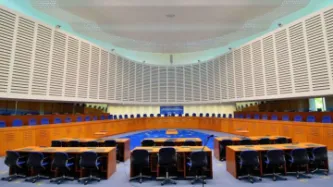Search
Content type: Press release
The case stems from a 2016 decision by the Investigatory Powers Tribunal (IPT), the UK tribunal tasked with examining complaints against the UK intelligence services, that the UK government could lawfully use sweeping ‘thematic warrants’ to engage in computer hacking of thousands or even millions of devices, without any approval by a judge or individualised reasonable grounds for suspicion. Thematic warrants are general warrants covering an entire class of property, persons or conduct, such as…
Content type: Press release
Today, the European Court of Human Rights (ECtHR) has handed down a decision in a case brought by Privacy International and a coalition of internet and communications service providers and campaign groups including the Chaos Computer Club (Germany), GreenNet (UK), Jinbonet (Korea), May First/People Link (US), and Riseup (US) (the “coalition”).The case challenges the conduct of hacking operations abroad by one of the UK’s intelligence agencies, the Government Communications…
Content type: Examples
The controversial Israeli spyware company NSO Group's US arm, Westbridge, has been trying to pitch its phone hacking software to US law enforcement agencies such as the San Diego Police Department, particularly a tool called "Phantom", which the complany claims can overcome encryption, track geolocation, withstand a factory reset, monitor apps and voice and VOIP calls, and collect passwords.
Writer: Joseph Cox
Publication: Vice
Content type: Advocacy
In December 2019 Privacy International made submissions to Police Scotland in relation to documents designed to explain to the public how cyber kiosks will work and what information will be given to victims when Police Scotland extract data from their phone.
Police Scotland rely on 'consent' to seize a phone from a victim. We believe the lack of information provided to the individual regarding extraction, examination, retention, deletion, sharing and search parameters undermines that any…
Content type: Press release
Caroline Wilson Palow, General Counsel at Privacy International
“The passage of the Investigatory Powers Act is a major blow to the privacy of people in the UK and all over the world. It sets a world-leading precedent, but not one of which the Government should be proud. Instead of reining in the unregulated mass surveillance practices that have for years been conducted in secret and with questionable legal authority, the IPA now enshrines them in law. Widespread surveillance is an antithesis…
Content type: News & Analysis
Privacy can be seen as a reflex of innovation. One of the seminal pieces on the right to privacy as the 'right to be let alone emerged in response to the camera and its use by the tabloid media. Seminal jurisprudence is in response to new surveillance innovations... though often with significant delays.
While one approach would be to say that privacy is a norm and that with modern technologies the norm must be reconsidered and if necessary, abandoned; I think there’s an interesting idea around…
Content type: Long Read
This piece originally appeared here.
On both sides of the Atlantic, we are witnessing the dramatic expansion of government hacking powers. In the United States, a proposed amendment to Rule 41 of the Federal Rules of Criminal Procedure would permit the government to obtain a warrant, in certain circumstances, to hack unspecified numbers of electronic devices anywhere in the world. Meanwhile, across the pond, the British Parliament is currently debating the Investigatory…
Content type: News & Analysis
Last month, the UK Information Commissioner's Office announced a “private investigator crackdown”, citing concerns that private investigators were using hacking techniques to gain access to personal information.
The use of dodgy private investigators and illegal hacking by private investigators in the UK has attracted significant media attention in the wake of the phone hacking scandals, which involved the use of such private investigators by major newspapers.
The sector isn't…
Content type: Press release
Privacy International, the leading global privacy rights NGO, has today filed a Judicial Review at the UK High Court, challenging the Investigatory Powers Tribunal's (IPT) decision that the Government can issue general hacking warrants. This decision means that British intelligence agency GCHQ can continue to hack into the computers and phones of broad classes of people - including those residing in the UK. The Investigatory Powers Bill, currently being debated in Parliament, seeks to…
Content type: Long Read
The recent back and forth between Apple and the FBI over security measures in place to prevent unauthorised access to data has highlighted the gulf in understanding of security between technologists and law enforcement. Modern debates around security do not just involve the state and the individual, the private sector plays a very real role too. There are worrying implications for the safety and security of our devices. Today, a new company stepped in to this discussion -- though it had been…
Content type: Report
Privacy International's new investigation (available in English and in Arabic), 'THE PRESIDENT'S MEN? Inside the Technical Research Department', sheds light on the Technical Research Department, a secret unit of the Egyptian intelligence infrastructure that has purchased surveillance equipment from German/Finnish manufacturer of monitoring centres for telecommunication surveillance, Nokia Siemens Networks, and Italian malware manufacturer, Hacking Team.
Content type: Long Read
It was summer 2014 when we first came across the acronym TRD while sifting through documents from the company Nokia Siemens Networks (Nokia) that had been leaked to Privacy International. The acronym was explained in the documents: it stood for Technical Research Department.
What we learned from the leak is the TRD had been purchasing an interception management system, a monitoring centre and an X25 network, a legacy technology allowing dial-up internet access. The first two technologies gave…
Content type: Press release
In response to the Investigatory Powers Tribunal (IPT) ruling today that GCHQ's hacking is lawful, we have issued the following press statement:
"We are disappointed by the IPT’s judgment today, which has found Government hacking lawful based on a broad interpretation of a law dating back to 1994, when the internet and mobile phone technology were in their infancy.
Until we brought this case, GCHQ would neither confirm nor deny that it was they were engaging in mass hacking of…
Content type: Long Read
The Investigatory Powers Tribunal (“IPT”) today held that GCHQ hacking of computers, mobile devices and networks is lawful, wherever it occurs around the world. We are disappointed that the IPT has not upheld our complaint and we will be challenging its findings.
Our complaint is the first UK legal challenge to state-sponsored hacking, an exceptionally intrusive form of surveillance. We contended that GCHQ hacking operations were incompatible with democratic principles and human rights…
Content type: Press release
Today’s report by the Joint Committee on the Investigatory Powers Bill is the third committee report that concludes that the Home Office has failed to provide a coherent surveillance framework.
The Joint Committee on the Investigatory Powers Bill today published a 198 page report following a short consultation period between November and January. Their key findings are that:
- the definitions in the bill need much work, including a meaningful and comprehensible…









